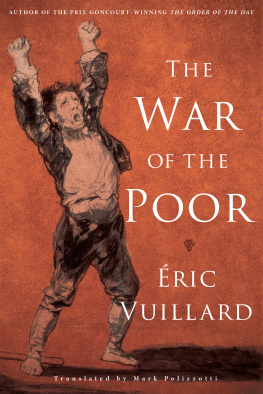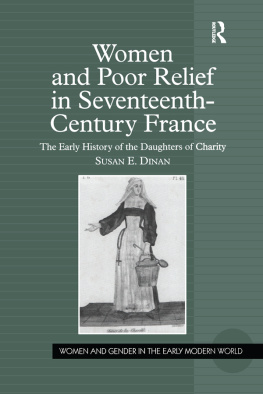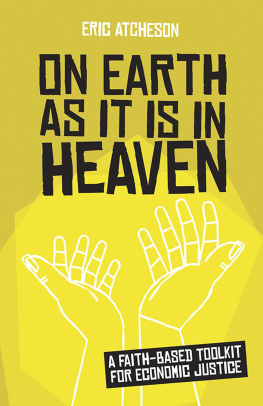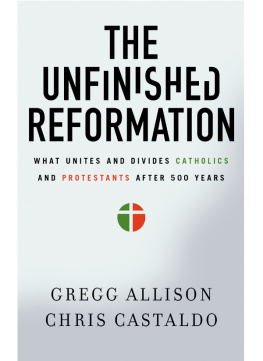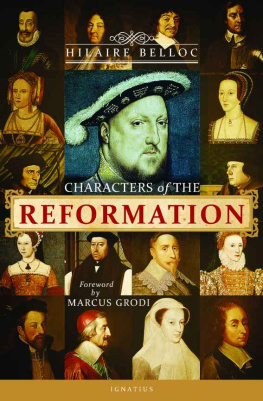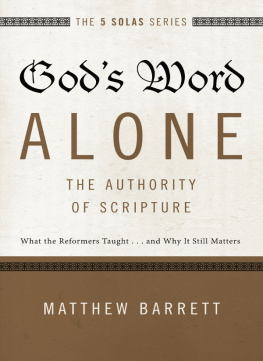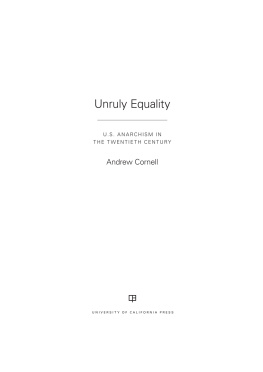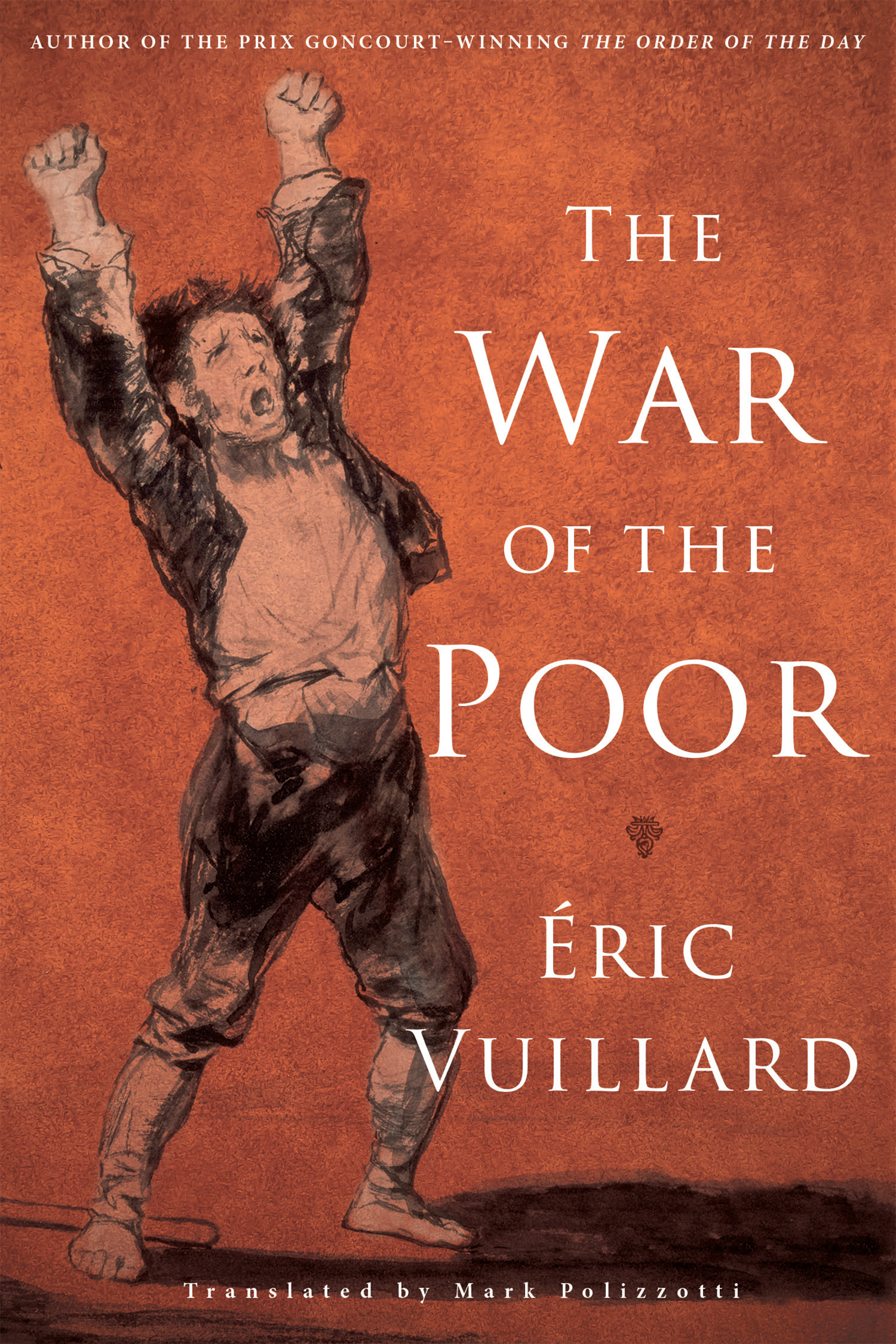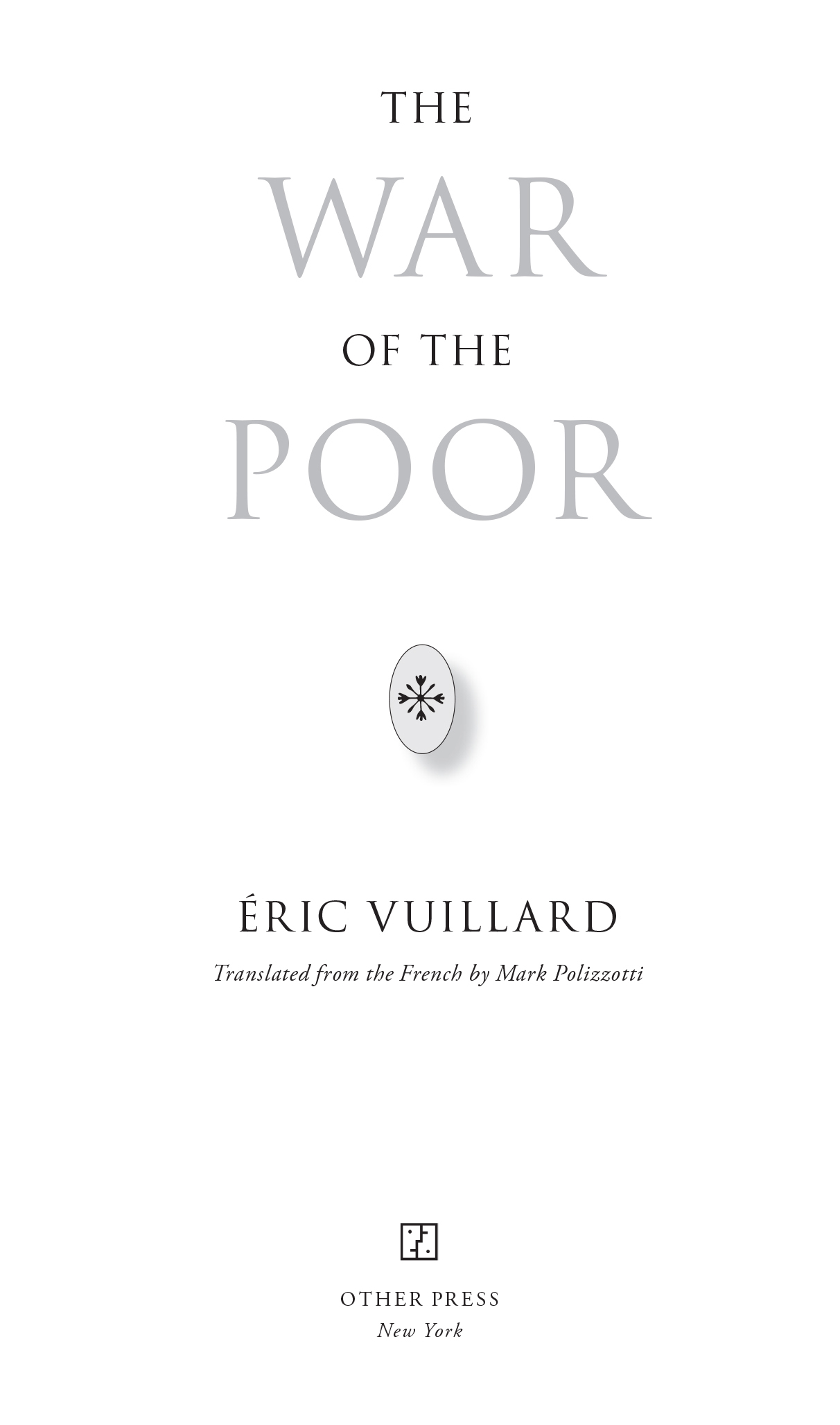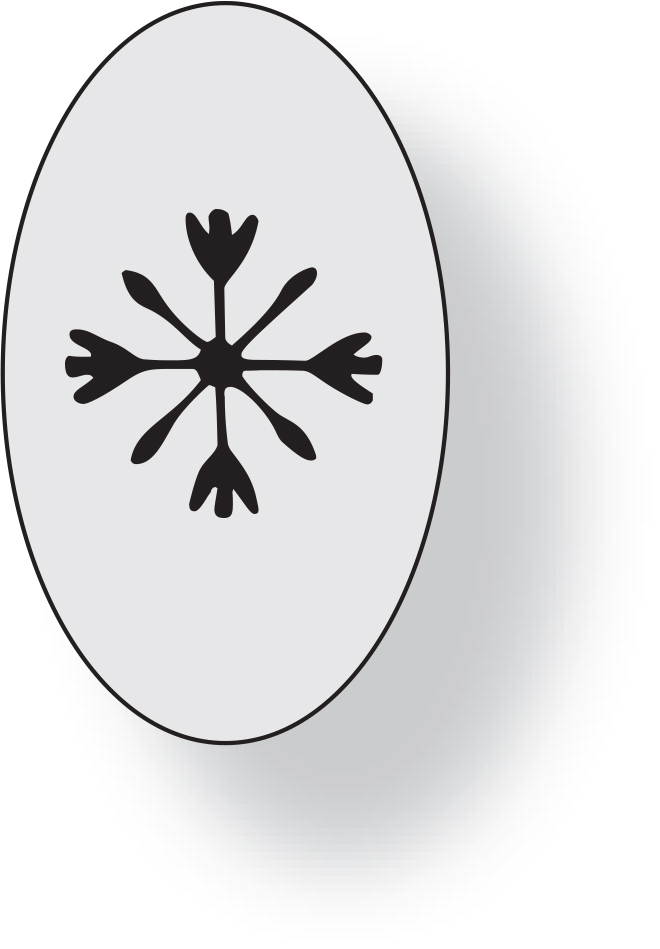Contents
Landmarks
Print Page List
ALSO BY RIC VUILLARD
The Order of the Day
Sorrow of the Earth
Copyright Actes Sud, 2019
Originally published in French as La guerre des pauvres in 2019 by Actes Sud, Arles, France
Translation copyright Mark Polizzotti, 2020
Published by arrangement with Actes Sud and 2 Seas Literary Agency
The translator gratefully acknowledges previously published English versions of Thomas Mntzers writings, in Thomas Mntzer Writings and Letters, trans. Andy Drummond; Thomas Mntzer, Sermon to the Princes, trans. Michael G. Baylor; and Friedrich Engels, The Peasant War in Germany, trans. Moissaye J. Olgin et al.
Production editor: Yvonne E. Crdenas
Text designer: Jennifer Daddio / Bookmark Design & Media Inc.
All rights reserved. No part of this publication may be reproduced or transmitted in any form or by any means, electronic or mechanical, including photocopying, recording, or by any information storage and retrieval system, without written permission from Other Press LLC, except in the case of brief quotations in reviews for inclusion in a magazine, newspaper, or broadcast. For information write to Other Press LLC, 267 Fifth Avenue, 6th Floor, New York, NY 10016. Or visit our Web site: www.otherpress.com
The Library of Congress has cataloged the printed edition as follows:
Names: Vuillard, ric, author. | Polizzotti, Mark, translator.
Title: The War of the Poor / ric Vuillard; translated from the French by Mark Polizzotti.
Other titles: Guerre des pauvres. English
Description: New York : Other Press, [2020]
Identifiers: LCCN 2020029868 (print) | LCCN 2020029869 (ebook) | ISBN 9781635420081 (hardcover) | ISBN 9781635420098 (ebook)
Subjects: LCSH: Mnzer, Thomas, approximately 1490-1525. | Peasants War, 1524-1525. | ReformationGermanyBiography.
Classification: LCC BX4946.M8 V8513 2020 (print) | LCC BX4946.M8 (ebook) | DDC 843/.914dc23
LC record available at https://lccn.loc.gov/2020029868
LC ebook record available at https://lccn.loc.gov/2020029869
Ebook ISBN9781635420098
a_prh_5.6.0_c0_r0
CONTENTS
THE STORY OF THOMAS MNTZER
His father had been hanged. Dropped into the void like a sack of feed. Theyd had to carry him on their shoulders at night; then he made not a sound, his mouth full of earth. After that, everything had caught fire. The oaks, the fields, the rivers, the white bedstraw on the embankment, the barren soil, the church, everything. He was eleven years old.
At age fifteen, he had formed a secret league to oppose the Archbishop of Magdeburg and the Church of Rome. He read the Epistles of Clement, the Martyrdom of Polycarp, Papiass Fragments. With several comrades, he praised Gods marvels, crossed the Jordan in a dressing gown; afterward he traced the cosmic wheel (a sign of assembly) on the ground in chalk and they each lay on it in turns, arms outstretched, so that Heaven might descend to Earth. And then he remembered the corpse of his father, the enormous tongue like a single, desiccated word. I was filled with joy, but one unites with God only through terrible suffering and despair. Thats what he believed.
They say that in Stolberg, there was a vintner by the name of Barthol Munzer. And they still talk about a Monczer Berld and a Monczers Merth, but nothing is known about them. There is also a Thomas Miinzer, killed in a bar brawl. We dont know if he got hit in the face with a fist or a log, nor do we know if he was related to Thomas Mntzer, the one whose father, around 1500, for reasons unknown, was executed on the orders of the count of Stolbergsome say hanged, others say burned.
Fifty years earlier, a molten substance had flowed, flowed from Mainz over the rest of Europe, flowed between the hills of every town, between the letters of every name, in the gutters, between every twist and turn of thought; and every letter, every fragment of an idea, every punctuation mark had found itself cast in a bit of metal. They had arranged them in wooden trays. Hands had plucked out one, then another, and composed words, lines, pages. They had moistened them with ink and a great force had slowly pressed the letters onto paper. They had repeated this procedure dozens and dozens of times, before folding the sheets into signatures of four, or eight, or sixteen pages. They had put them in sequence, glued them together, sewn them, bound them in leather. They had made a book. The Bible.
And so, in the space of three years, they had made one hundred eighty copies, where in that time a single monk could have made only one. And then the books had multiplied like maggots in a corpse.
Now, young Thomas Mntzer read the Bible, grew up with Ezekiel, Hosea, Daniel; but they were Gutenbergs Ezekiel, Gutenbergs Hosea, Gutenbergs Daniel. And after passing through the rotten, yawning gate that scraped the ground, he spent long hours downstairs in the old kitchen, rubbing his eyes. He didnt know what he was seeing or what he was supposed to see. He was solitary like a thief, and innocent.
Time passed. He lived with his mother, no doubt frugally. His heart hurt. Beneath the oaks, the pines, on the poor soil of the Harz Mountains, as he chased after pigs with the other children, he must have suddenly stopped short, alone, feeling foolish, and wept. Yes, I imagine him on the edge of a river of small black pebbles, the Wipper, perhaps, or the Krebsbach, no matter; or else on the flanks of sad little summits of chaotic rock, eroded cliffs, shabby peat bogs, in the Bode or Oker valley, suffocating in a mix of bitterness and love.
Finally, he enrolled as a student in Leipzig, then became a priest in Halberstadt and Brunswick, then a provost here and there, then, after considerable tribulations among the Lutherite plebeians, he emerged from his hole in 1520, when he was named a preacher in Zwickau.
ZWICKAU
Outside the borders of Saxony, hardly anyone knows Zwickau. Its just another backwater. Zwicker means pince-nez; Zwickel means gusset; Zwiebel, onion; and zwiebeln, to harass or bully. But Zwickau means nothing, or else it means onionskin, poor slobs, good business, yes, thats what Zwickau means: poor slobs and good business. For in Zwickau they wove, they wove a lot, they wove for the whole world, for people in Frankfurt and Dresden; back then, they say, even in Paris some people slept on Zwickau sheets. And on top of that, in Zwickau they dug the earth, exploited the mines. And so, right after the Welsers and the Fuggers come the burghers of Zwickau.
The burghers heard Mntzer preach at St. Marys church, as a temporary replacement for Johann Sylvanus Egranus. When Egranus returned, they appointed Mntzer to St. Katharines, a parish of weavers and miners. There, he mixed with the Zwickau reformists Nikolaus Storch, Mark Stbner, and Thomas Drechsel. That shadowy trio was raising holy hell, wallowing in ecstasy, visions, and dreams, waiting for those moments when the Good Lord would speak to them

